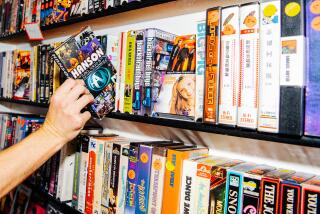Static Grows Over Sale of Slow-Speed Videos
- Share via
Nothing makes a home video customer angrier than buying or renting a defective tape--one that has a grainy picture, washed-out colors or sound that fades in and out.
These defects are usually accidental. But there’s a storm brewing over some cassettes that have inferior picture quality and sound because they’ve been recorded at a slow speed. Some retailers have returned these to the manufacturers as defectives.
For the record:
12:00 a.m. April 3, 1988 For the Record
Los Angeles Times Sunday April 3, 1988 Home Edition Part 1 Page 2 Column 4 National Desk 2 inches; 45 words Type of Material: Correction
The FBI said that its statement in Friday’s editions that the 1987 racketeering and drug trafficking indictment of Peter Milano and four other area men was related to a joint U.S.-Italian heroin smuggling investigation was incorrect. The error occurred, the FBI said, because the same agents had worked on both cases.
Almost all movies and other programming on videocassettes are recorded at the fastest speed--the SP mode. Recording at medium speed (LP) or the slowest speed (SLP or EP) results in progressively worse quality. However, smaller home-video companies like IVE and Congress have been offering low-priced tapes in the SLP mode.
But the recent furor resulted when Nelson Entertainment--one of the majors--introduced a line of slow-speed tapes in late February at $14.98. The titles mainly consisted of old ABC-TV movies such as “The Day After,” “The Jericho Mile” and “Attica”--all originally released at a higher price in the SP mode.
“We record tapes at the slower speed because you use less tape and save money in production costs,” explained Rand Bleimeister, Nelson’s executive vice president. “At $14.98, the wholesale price is so low you need that extra buck or so you save in blank tape to make a profit.”
Bleimeister readily admitted that the quality of SLP tapes isn’t up to SP. In this reporter’s comparisons of the SP and SLP versions of two titles--”The Jericho Mile” and “The Day After”--the difference was noticeable but not glaring.
However, Houston retailer Ron Berg, the leader of the anti-SLP forces, feels many slow-speed tapes are of such low quality that they should be considered defective.
“The sound drifts in and out, the colors blur and when there’s writing on the screen, it’s often blurry too,” Berg said of the Nelson tapes. Bleimeister acknowledged his company had received 10 complaints about the quality of the new tapes, all from retailers.
What really incensed Berg is that on the Nelson packages, it’s not readily apparent that the tapes are recorded in SLP, which, he insisted, can create problems for customers: “On the back of the package in small print, it says it’s recorded in SLP. But most people wouldn’t know to look for it.”
Nelson’s low-priced SLP tapes could be the tip of an iceberg. The company is plunging heavily into this market, introducing four new slow-speed, $14.98 titles--including “City on Fire” and “The Rabbit Test”--on April 27. Bleimeister said Nelson plans to convert four older titles to SLP every month. “Our goal is to ship a million of these cassettes this year,” he said.
Some better-known titles may also get the slower-speed, under-$15 treatment. “The China Syndrome,” “The Owl and the Pussycat” and 50 other titles previously released at a higher price by RCA/Columbia have been sub-licensed to Goodtimes Video, which will reportedly re-release them this summer recorded at LP, the medium speed.
“More and more companies could get into this,” Berg said. And if they do, he warned, “it will drop the industry standard (of quality) a notch or two.”
More to Read
The biggest entertainment stories
Get our big stories about Hollywood, film, television, music, arts, culture and more right in your inbox as soon as they publish.
You may occasionally receive promotional content from the Los Angeles Times.








